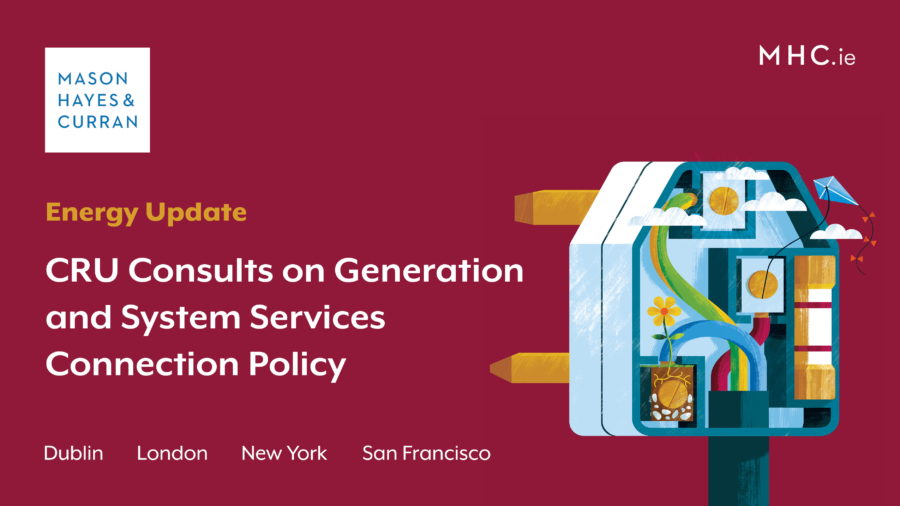
The Commission for Regulation of Utilities is developing a new electricity generation and system services connection policy. The policy will aim to facilitate the deployment of renewable energy generation to allow the Government’s challenging targets and timelines to be met. Our Energy team reviews the CRU’s latest Consultation Paper in this area.
The Commission for Regulation of Utilities (CRU) has launched a public consultation on a new electricity generation and system services connection policy. The consultation is now in the second stage of the CRU’s policy process. It contains 37 main questions for input/comments, with further requests within each of these questions. It introduces the new connection policy in the context of the Irish Government’s targets and commitments for renewable electricity generation and sets out several topics to guide the feedback that the CRU is hoping to receive.
The CRU previously published its Electricity Generation and System Services Connection Policy Call for Evidence[1] in May 2023 (Call for Evidence). This asked for stakeholder feedback on the development of a new connection policy to support the delivery of Ireland’s electricity targets within necessary timelines set out in the first revision of the Renewable Energy Directive (RED II)[2].
The latest Consultation builds on the Call for Evidence and will gather further information which the CRU will use to make a policy decision. The target publication date for this policy decision is Q1 2024.
Scope of the policy
The policy will apply to onshore renewable and conventional generators, energy storage and other system services technology projects to connect to the electricity system.
The CRU has clarified that while the Call for Evidence did not originally refer to autoproducers, they will fall within the scope of the new connection policy. Autoproducers are facilities that produce electricity equal or greater, no more than two and a half times, than the facility requires to reduce their dependency on the grid.
Exclusions
Notably, interconnectors, demand connections, micro-generation, offshore electricity connections, and private wires are proposed to be excluded from the scope of the new policy.
Proposed policy aims
The consultation paper sets out the proposed aims for the new policy and the purpose for its creation, namely:
- Ensuring Security of Supply and the quality of electricity supplies.
- Providing certainty for future onshore electricity project development by setting out the rules for connection.
- Supporting the delivery of Ireland’s renewable electricity targets, including Carbon Budget and Sectoral Emissions targets, by making sure that connection policy facilitates regular processing of connection offers for renewable electricity and other technologies that support renewable electricity.
- Ensuring that Article 16 of RED III is implemented to align grid-permitting timelines with the requirements of RED III. Article 16 of RED II and the recast RED III sets out several requirements for the permit granting process for renewable energy projects, including maximum administrative review periods for renewable energy projects
- Promoting efficient and best use of existing grid infrastructure and development of future infrastructure to deliver value to energy consumers, including enabling repowering.
- Facilitating mini-generation, small-scale generation and renewable energy communities.
- Ensuring swift, effective decision-making and reducing unnecessary administration.
Consultation topics
The consultation paper is broken down into different areas of discussion. For each of these areas, the consultation paper provides a summary of what was included in the Call for Evidence, the responses received and the specific topics on which the CRU is currently seeking feedback.
These topics include:
- Application process and batch sizes: the consultation requests feedback on the CRU’s current preferred approach to introduce a bi-annual batch application process, ie twice every year, without caps for renewable generators. The current policy involves a single annual window.
- Interactions with the planning process: this section concerns the potential value of increased alignment of the grid process with the planning process. The consultation paper sets out two options:
- Option 1 provides that the requirement of having received planning permission to apply for a grid connection could potentially be changed to allow projects to apply under the new connection policy prior to receiving planning permission. To prevent large numbers of speculative applications, achievement of other milestones could be applied instead.
- Option 2 is an updated pre-engagement process between the System Operators (SOs) and potential applicants, which could also help reduce timelines, ie the grid process could require projects to formally engage with the SOs prior to submitting their full application (for both planning and grid) and be required to notify the SOs on submission.
- Finally, option 3 is a combination of measures of both the above options to be applied at the same time, ie pre-engagement and parallel processes.
- Capacity market and security of supply: the consultation asks respondents if they agree that capacity auctions and Low Carbon Inertia Services (LCIS) or similar procurement initiatives should be included in the new connection policy.
- Locational signals: the consultation asks whether respondents consider that a form of locational prioritisation could be appropriate and whether respondents consider that locational signals should be provided for non-generation technologies.
- Costs and charges: the consultation asks how additional transparency might be provided for network charges, whether the charging methodology should be amended and seeks respondents’ views on the charging options provided in the consultation. The consultation also seeks respondents’ views on the need for charges in “lower-priority” areas to be set specifically for relevant projects, for example, where projects drive significant network upgrade costs.
- Community-led projects: the consultation asks how community projects could be supported through the new connection policy and whether respondents would be supportive of managed access for community projects to reduce the associated grid connection costs. It also asks if there are additional considerations for community-led projects for interactions with the planning process.
- Hybrids, storage, and repowering: the consultation asks whether there are energy storage, hybrids, and repowering categories which should be considered outside the batch process, and if such prioritisation criteria are to be applied, what might these be and whether any caps should be applied.
- Mini-generation, small-scale generation, and MEC=0: the consultation requests feedback on both the Mini-Generation Pilot and the Small-Scale Generation Pilot. It also asks whether respondents consider that a separate application process is required for non-exporting generators and if so, whether respondents support the introduction of an application fee for the MEC=0 process to reflect the cost associated with these applications.
Conclusion
The consultation provides a key opportunity for interested members of the public and the energy sector to input into what will be a key energy policy for Ireland. You can have your say and submit your comments via email to electricityconnectionpolicy@cru.ie by close of business on 16 February 2024.
Full details of the consultation can be found here.
For more information, contact a member of our Energy team.
The content of this article is provided for information purposes only and does not constitute legal or other advice.
[1] The CRU’s Electricity Generation and System Services Connection Policy Call for Evidence (CRU202341)
[2] The Renewable Energy Directive has recently been revised a second time and the second revision is referred to in the consultation paper.
Share this:




